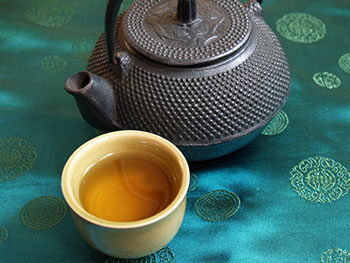More Health and Nutrition Bites
Related
Tea and Digestive System Cancers
The flavonoids found in grapes, tea, red wine, cocoa, and coffee have been linked to all sorts of positive health effects, from helping protect cognitive function to helping to protect you from diabetes.
Coffee, Tea and Brain Tumors
Brain tumors make great television, but the truth is that they're pretty rare: the risk of developing a brain or nervous system tumor of any kind are between 4 and 8 per 100,000 person-years. Since they're so rare, there's very little opportunity for studying prevention. A group of European researchers noted that a study in the United States had suggested that there was an inverse relationship between coffee and tea intake and the risk of glioma, a tumor that most often arises in the brain (although it does sometimes appear in the spinal cord).
Drinking black tea may reduce your risk of ovarian cancer
Judging from the women in my practice, ovarian cancer may well be the most-feared diagnosis, even more than breast cancer. Why? Because the vast majority of ovarian cancers are not detected until they are quite advanced: only 15% of all ovarian cancer patients are diagnosed at an early stage of the disease (ovariancancer.org). While about 44% of all women diagnosed with ovarian cancer survive for at least five years after diagnosis, that statistic is for all women diagnosed at all stages.
Health & Nutrition Bites
Get the latest health and diet news - along with what you can do about it - sent to your Inbox once a week. Get Dr. Gourmet's Health and Nutrition Bites sent to you via email. Sign up now!
What green tea extract may actually do

I get asked all the time about weight loss supplements: do any of them work? There are really two problems with most weight loss supplements. The first, and most concerning from a drug interaction standpoint, is that because the supplement industry is not regulated by the Food and Drug Administration (FDA), you can not be certain what any supplement pill actually contains. Aftermarket tests of common supplements, especially those marketed for weight loss, have been found to contain a wide variety of active ingredients that don't appear on the label. These ingredients have included everything from trace amounts of prescription weight loss medications that have been removed from the market for being dangerous to ingredients that can interact negatively with other medications.
The second problem with weight loss supplements is that there's no solid evidence that they work. Research you might see cited on the product's website often has not actually been published in a peer-reviewed publication, meaning it's not been subject to critical scrutiny. Other times the study might have been published, but it's too small to be applicable to the overall population, or (and worse) there might be no control group. (As my wife likes to say, "The plural of anecdote is not data.") There's also the question of dosage: the appropriate dosage for prescription drugs is determined by careful research so that any side effects are minimized. Once again, often this very important safety research hasn't been done for supplements, even when the active ingredient has been identified.
Today we have good news, however. A team in Taiwan designed a placebo-controlled study to assess the effects of a decaffeinated green tea extract on weight loss in obese women (Clin Nutr 2016(35):592-599). Seventy-seven women between the ages of 20 and 60 with a Body Mass Index of at least 27 and a Waist Circumference of at least 80 centimeters participated in the 12-week study. The women were all otherwise healthy, with no liver or kidney problems, heart trouble, thyroid problems, or diabetes.
Half the women were assigned to take a standard dose of green tea extract three times per day (after meals). The other half of the women took a placebo. The women were instructed to follow their usual diet and engage in their usual amount of exercise throughout the study, and to verify this they kept dietary and exercise records. At the start and end of the study the women's height, weight, and Waist Circumference were measured, and blood was drawn for cholesterol scores, blood sugar levels, and circulating levels of appetite-related hormones.
Those women taking the green tea extract lost about 1.1 kilograms, on average - about 2.4 pounds. Those taking the placebo actually lost more weight: an average of 2 kilograms, or 4.4 pounds. Similar results applied for waist circumference: the green tea group lost an average of 2.3 centimeters from their waist while the placebo group lost 4.2 centimeters.
The weight loss results might have been disappointing, but other results are much more interesting. The women in the green tea group improved their total cholesterol significantly more than the placebo group, decreasing their score by 7% while the women in the placebo group actually increased their score slightly. Similarly, they reduced their LDL cholesterol (the bad cholesterol) by as much as 10% while the placebo groups' score also increased slightly.
What this means for you
The green tea extract used in this study was highly purified product that is not available commercially. While this study is encouraging, you should not take it as a license to start taking green tea extract from the corner drugstore in order to treat your cholesterol. The best way to improve your cholesterol score is to follow a Mediterranean-style diet that's high in whole grains and low in saturated fats, and to take any prescription cholesterol medication as your doctor recommends.
